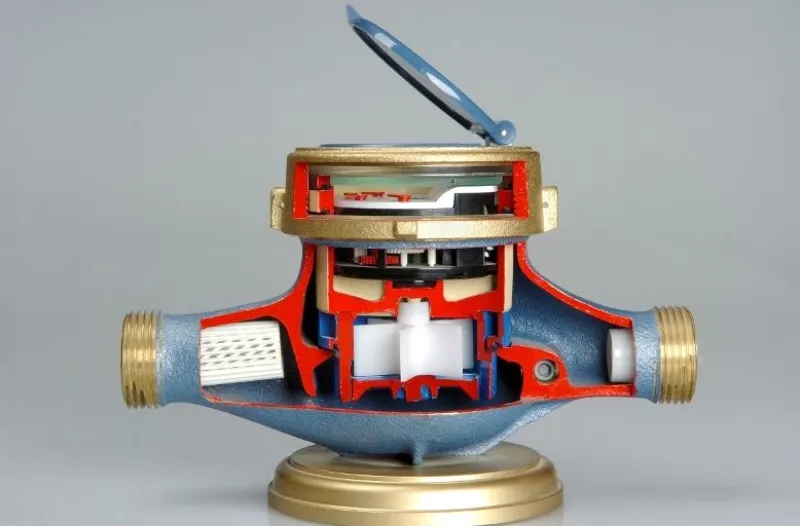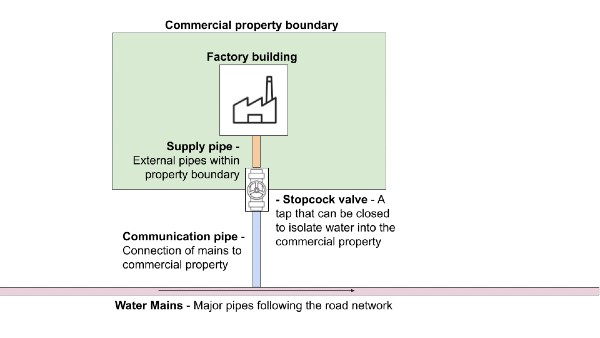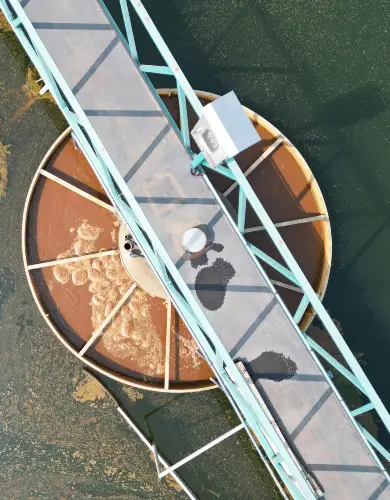A comprehensive guide to water meters
Water meters are an essential part of a broader effort to manage Britain’s water resources more sustainably and address water scarcity, particularly in the southeast of England.
As part of this initiative, local water companies are rolling out meters in high water-stress areas to promote water efficiency and improve leak detection.
In this comprehensive guide to water meters, we cover:
What is a water meter?
A water meter is a device that measures the volume of water passing from the water network into a property that uses mains water. Most business and home properties in the UK have a water meter where the mains pipe enters the property’s boundary.
For businesses:
- Business water rates are charged per unit cubic meter of water a property uses, as measured by the water meter.
- Business water suppliers measure how much water is being used by your business at the meter and charge you accordingly.
Water meters are the same as electricity and gas meters used by business energy suppliers, but for water, the dial on the front of a water meter measures the volume of water passed through it since it was installed.
How does a water meter work?

The water meters installed at commercial and home properties use a positive displacement chamber to measure the volume of water passing through them. Inside the meter, the water flow physically moves mechanical components in the meter that rotate the dial on the front.
Water meters are calibrated so the front dial accurately measures each cubic meter of water passing through.
💡 More modern water meters have a digital dial on the front but use a similar analogue mechanism behind the scenes.
Finding your water meter
Water meters are typically installed on the boundary of your property, where a water pipe connects your property to the local water infrastructure.

As the water mains often follow the road network, a common place for water meters is under the pavement outside your property. You’ll be looking for a purpose-built water meter box like this:

Larger properties with more than one water meter or larger meters are likely to be installed in a plant room somewhere inside the building.
If you are still having difficulty locating your water meter, it’s worth contacting your business water supplier, who may be able to look up your meter on the central water market database.
The central database (operated by MOSL) records where meters were first installed; however, these details are often imprecise or incomplete.
Taking a water meter reading
Water meters have a dial that displays the volume of water that has passed through the meter since its installation, measured in cubic metres.
To take a water meter reading, record the figures on the front of the meter and then submit them to your water supplier along with the date of the reading.
For a full visual guide, visit our dedicated page on submitting a water meter reading.
How often are water meter readings taken?
Your business water supplier should arrange for a meter reading to be taken every six months.
However, we recommend that you take and submit meter readings more regularly than this. The advantages of taking regular meter readings are:
- Your business water bills will be more accurate.
- If your property has recently been vacant, it will stop your water supplier from continuing to charge you for water.
- It will help you detect water leaks.
What if I don’t have a water meter?
If your business or home doesn’t have a water meter, then your water supplier will charge for water and sewerage services in one of the following two ways:
- Assessed charges – Assuming a fixed water consumption each year based on property type.
- Rateable value – A fee based upon the rateable value of your property.
The Water Industry Act 1999 states that consumers of water may request a water meter, and the local water company will be obliged to install the meter unless the installation is not reasonably practical or if doing so would incur an unreasonable expense.
Find out if you can save money by requesting a water meter installation with our water meter calculator.
Water meter installation
Water meter installations are typically carried out by your local water company.
A water meter installation takes approximately two hours, during which there will be a temporary interruption to your water supply.
An engineer will excavate a small area at the boundary of your property to access your water pipe. A short section of pipe will be replaced with the fittings for a water meter.
💡 If you need to arrange an entirely new water supply for your commercial property, read our full article on business water connections.
What is a smart water meter?
A smart water meter measures water usage in the same way as a traditional water meter but can also transmit a meter reading wirelessly to your supplier.
A typical smart water meter will electronically send the figures displayed on the front of the meter to your supplier every 15 minutes. You can also access this “live” water consumption data through an online portal.
Smart water meters are becoming increasingly common in the water industry as they can detect commercial water leaks in real-time.
Read our full guide to smart water meters to learn more about their benefits and how to get one for your business.
Water meter regulations
Water meters installed in the UK are covered by the Measuring Instruments Directive, which sets a framework for their manufacture and accuracy.
The regulations require that:
- Water meters must accurately measure water flow within the limits of ±2% accuracy for high flows and ±5% for low flows.
- Water meters must produce reliable meter readings over their entire operational life of between 10 and 15 years.
- Water meters must be designed to resist tampering.
Water meter FAQs
Here are our answers to frequently asked questions that we have encountered on water meters in Britain.
What does AMR stand for?
AMR stands for Automatic Meter Reading and refers to any technology that automatically collects consumption data from water meters and transmits it to a central database for billing, troubleshooting, and analysing.
All smart meters use AMR technology, which makes them “smart” and a cornerstone of any IoT (Internet of Things) network as it provides crucial water usage data for decision-making.
Some water companies define “AMR devices” as sensors that can read water meters from a distance. This allows water company staff to take thousands of readings daily by driving slowly on the same road as the water meters.
These devices will soon cease to exist, though, as they are replaced by fully-wireless smart meters.
Is my water meter faulty?
If you suspect that your water meter may be faulty and giving inaccurate meter readings, we suggest considering a water audit.
In a water audit, experts will analyse the historical consumption of water and meter readings at your property to determine if there is a problem. A site visit will follow, where an expert can physically inspect and test the meter.
Where a faulty meter has been identified, we can help you reclaim over-charging from your supplier for up to five years.
Are water meters compulsory?
For households, this depends on your area. In the British water industry, water wholesalers can choose to install meters in their network.
In practice, most commercial properties have a water meter. Around 5% of businesses operate under an unmeasured water tariff, and these are usually the cases where the cost of installing a water meter is prohibitive.
In the household water market, the picture is much more mixed. Some wholesalers are rolling out a universal metering programme to help them manage the water network.
Legally speaking, a water network operator can insist on installing a water meter if a house:
- uses an automatic watering device (such as a garden sprinkler);
- automatically fills a swimming pool or pond;
- has a large bath;
- uses a reverse osmosis softening unit;
- has a power shower;
- is located in an area of serious water stress.

